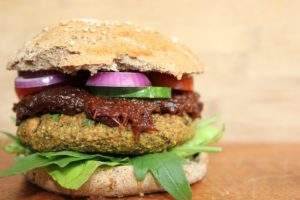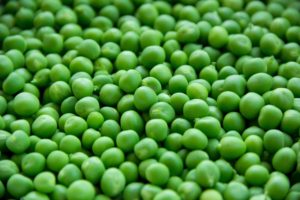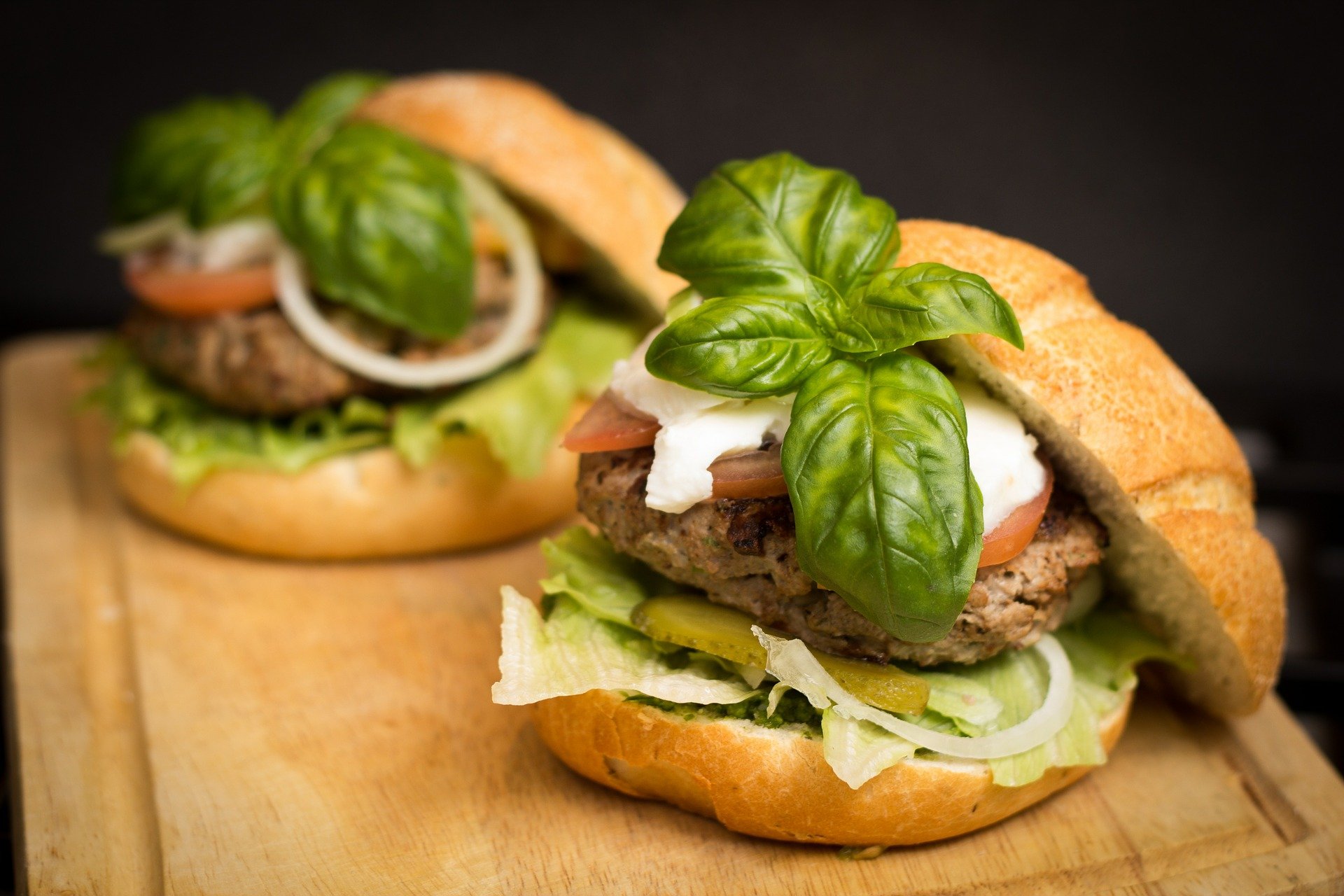What are Meatless Burgers Made Of?
You know something is big if chains like McDonald’s and Burger King add it to the menu. That’s exactly what happened with Beyond Burgers, which are one of the most popular meatless burgers. But let’s backtrack a bit: what are meatless burgers made of anyways?

Meatless burgers or plant-based burgers are no new concept. Meat alternatives in burgers and other meat-based dishes have been around for a while. However, some new products, or should we say inventions, truly revolutionized plant-based burgers by giving us taste and texture as close to the real deal as possible.
The plant-based meat sector has grown to become a $20 billion industry in 2020. And it’s poised to grow even bigger if numerous industry estimates are anything to go by. So meatless burgers are definitely one of the most popular and successful foods right now.
What are Meatless Burgers Made Of?
Let’s dig right into the main question. The actual composition of meatless burgers varies by different brands. However, most source the protein from plants.
For instance, Beyond Meat uses protein and fat from plant sources, such as peas, faba beans, and rice mung bran. Of course, there’s the involvement of technology that helps create the meaty texture and taste from these plant sources.

So meatless burgers are, in fact, made of nothing but veggies and other plant-based ingredients. Normally, they use heating and pressuring techniques to bring out the texture and color that you would find on real burger patties made with beef or turkey.
Impossible Burgers, which also commands a big chunk of the alternative meat market, uses soy protein. It also uses heme, which comes from fermented yeast. Again, all the ingredients come from plants; although you may say yeast isn’t exactly plant-based, it is considered vegan.
There are other variations in plant-based meat as well, most notably mycoprotein. Mycoprotein was championed by Quorn, a British company that came up with this plant-based protein to create alternative meat products, including burgers.
So if you’re buying Quorn burger patties, it’s actually the mycoprotein that makes the meatless burger. If you’re wondering what is mycoprotein, it’s basically a single-cell protein obtained from a specific fungus. It’s fermented and processed in a similar way as beer, and in the end, you get a meat-like texture.
It’s important to note that there are no GMOs in these burgers, which makes them safe for consumption.
Other Ingredients
Aside from the protein, meatless burger patties contain the typical nutrients, minerals, and, of course, water content that’s there in meat. So it’s not merely protein but also the other building blocks of meat that come together to create fake meat.
They also contain important minerals and vitamins, of which the most important is Vitamin B12. As you know, vegans are often deficient in this vitamin, so plant-based meat can help meet the necessary intake requirements. Much like real meat, plant-based burgers are also not rich in fiber, mainly because of their processed nature.
Another thing to wary of is the sodium content. Since these plant-based burgers are highly processed, the sodium content is high, as is in real meat patties.
Difference Between Meatless and Veggie Burgers
Before these big alternative meat companies came on the scene, meatless burgers were basically veggie burgers. And veggie burgers go way back.

Veggie burgers were basically patties made of mashed vegetables. These were made with whole vegetables, not individually obtained nutrients, especially protein. So they pretty much tasted like vegetables and not meat.
Although you could call meatless burgers veggie burgers, they are different. The actual ingredients, the process, and most importantly, the taste and texture differ significantly from veggie burgers. The two meatless burger giants Beyond Meat and Impossible Foods market on the flavor, which they deliver, at least to some extent.
Veggie burgers were always targeted at vegetarians who are fine with the taste of vegetables in their burgers. However, these new meatless creations are targeting people who enjoy meat, which has massively increased their audience. So it’s not just vegetarians or vegans who consume it because of their dietary restrictions, but also meat-eaters who want to reduce meat intake or just want to try something new.
Meatless Burger vs. Meat Burger
Now that you know what are meatless burgers made of, it’s time to discuss how they fare against the real deal, you know your beef burgers. After all, the whole point is to eliminate or reduce meat consumption, so it only makes sense to compare these burgers to those.
Both Beyond Burgers and Impossible Burgers are basically like beef burgers but not beef. However, if you take a quick look at the nutritional chart, you won’t find a significant difference between meatless patties and real meat patties. Of course, there are a few important differences.
Comparison
https://pixabay.com/photos/burgers-fire-grill-grilling-cook-1839090/
This Harvard Health Publishing article reviewed the two main burgers: Beyond Burgers and Impossible Burgers. They also compared their calories and nutrient breakdown with beef and turkey burgers. Here’s what you need to know:
Impossible Burger (4 oz):
- Calories: 240 kcal
- Protein: 19 g
- Fat: 14 g
- Saturated Fat: 8 g
- Fiber: 3 g
- Cholesterol: 0
- Sodium: 370 mg
85 Percent Lean Ground Beef Burger (4 oz):
- Calories: 240 kcal
- Protein: 21 g
- Fat: 17 g
- Saturated Fat: 6 g
- Fiber: 0
- Cholesterol: 80 mg
- Sodium: 80 mg
As you can see, the calories are basically the same between Impossible burger and an 85 percent lean ground beef burger. Protein and fats are also comparable. However, cholesterol is significantly higher in beef patties. There’s no cholesterol in meatless burgers by Impossible.
On the other hand, sodium is much higher in the processed meatless burgers. They do contain fiber, but it’s very little to make a big difference. Still, in comparison, you get some fiber, which is mainly because these come from plant sources.
As this analysis shows, meatless burgers are not exactly low in calories if that’s something you’re after. In comparison, both have the same number of calories. In fact, Beyond Burger patties pack in 250 kcal in a 4 oz. patty.
Are Meatless Burgers Good For You?
Meatless burgers thrived on the premise that meat is essentially bad for you.
Since meat, especially red meat, has been linked with the risk of heart disease, cholesterol, diabetes, and even cancer, people wanted a healthier meat alternative, especially those in the plant-based and vegan communities.
As we’ve seen, nutrition-wise, there’s not so much difference between fake and real beef patty to patty. However, since meatless doesn’t come from animals, it does spare you of the likely health hazards of meat. As they contain no cholesterol or trans fats, you can count on them to not be as hazardous for heart health as burgers made of ground beef.
Then comes the fact that they come from plant sources, so you do get the same nutrients as you would with plants. However, it’s important to understand the distinction between plant-sourced and plants. While the ingredients are plant-based, they are not whole foods.
Meatless burgers, at the end of the day, are highly processed. Because of that, they have a high sodium content. Moreover, you can’t expect the same nutrition as you would with whole veggies and beans for protein.
So the jury is still out on meatless burgers being super healthy. Are they healthier than meat? In some aspects, yes. Are they super healthy? Probably not!
You do have to consider that it must take many chemicals and ingredients to isolate the plant protein. Then those individual nutrients go through so many processes. They are bound to lose some goodness during the process.
Environmental Impact
When considering whether meatless burgers are good for you, one has to consider the environmental impact too. It’s no news that beef production is one of the biggest sources of greenhouse gases. From ranches where the cows graze to the massive factories that process the meat, the industry as a whole is a major contributor to global warming.
Plant-based meat alternatives are helping curb those emissions by providing these alternatives. Their carbon footprint is much less as compared with that of a real beef burger patty.
A 2018 report, commissioned by Beyond Meat itself, on the environmental impact of Beyond Burgers in comparison with beef, resulted in some impressive findings. The production of Beyond Burger generated 90 percent fewer greenhouse gases than that by beef burger patty.
That’s a major win for plant-based burgers as climate change has become an imminent threat. That’s one of the reasons driving up sales for these two vegan burger companies. Climate-conscious consumers, whether vegan or not, are picking up these burgers in aisles to help reduce their own carbon footprint.
Are Meatless Burgers Tasty?
The answer to this question depends on who you ask. The best way to decide whether meatless burgers are tasty or not is to try them and decide for yourself. You know how they say if you never try, you’ll never know.
There’s enough evidence and anecdotes that show that meatless burgers taste pretty close to real beef burgers and, therefore, taste good. The glaring evidence of that is the fact that most alternate meat sales come from non-vegetarians and non-vegans. Yes, your average meat-eating Joes are also turning to these delicious burgers.

Then you also have to consider that Burger King has also added these burgers to their menu. Also on the list are some top-notch restaurants in major cities in the US that are serving meatless burger options alongside regular burgers. Now, that’s saying something.
All that said, there are people who would go back to their juicy meat burgers even after tasting these plant-based burgers. So it really just comes down to your own taste palette and criteria for judgment, whether you’re eating just for the taste or for the fact that they are slightly healthier than meat options.
Wrap Up
So to answer your questions, what are meatless burgers made of: they are made of a variety of plant-based proteins. Even though the premise of making these burgers is to provide a healthier alternative to meat, they are not 100% healthy. You simply can’t beat the goodness of whole foods with something as processed as a burger.
If you’re following a plant-based diet and like burgers, these meatless burger patties can be a great solution. However, you should eat in moderation and focus more on whole vegetables, fruits, beans, and nuts.











